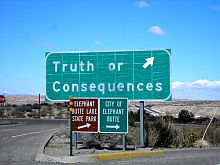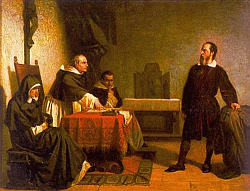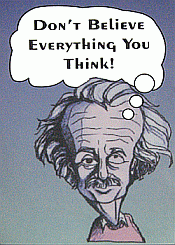
"After thirty years I can resist my conscience no longer."
The man had long labored under an injustice. For thirty years he’d been held responsible for an act of destruction that had actually resulted from an accidental oversight of his sister’s.
Now the fault was to be remedied . . .
“It was thirty years ago,” he said. “Surely you can tell Mom the truth now?”
“All right,” said the sister, turning to confess to the mother: “It wasn’t him,” she said, “it was me. I let it happen.”
The man felt a wave of relief wash through him. At last the truth was out.
Until: “Oh no it wasn’t, darling,” said the mother briskly, “you’d never do anything like that.”
Both brother and sister were left staring at each other, mouths agape.
For love of the truth
Gifted individuals love the truth.
In the terms of the last post – Essential nutrients for the gifted – the truth supplies essential nutrients to one’s intellectual environment. It is therefore a primary motivator for each of us, gifted or not.

There is a place for the truth. But can you pay the price?
However, the gifted are more demanding than average so their passion for the truth – their profound need for the truth – is likely to lead them further down arcane paths than the average person.
It also leads them into acting on the truth – walking their talk – to a greater extent than less-gifted others.
The result of this quest – this compulsive exploration – is where originality, creativity and exceptional results of all kinds spring from.
It is also the path of isolation and loneliness and even possible death. The truth can force us into a community of one – and a hated community at that. Just ask Galileo.
The absolute truth is . . .
Scientists such as Galileo make their observations and report them. But they acknowledge that their current understanding is just that: a snapshot of what things seem to be at the moment.

"Don't look so taken aback, Galileo! We've told you before: the truth is no defense."
There is no way to prove that today’s observations will be the same tomorrow. So all our scientific ‘facts’ are really working assumptions. They are assumptions sometimes supported by a lot of evidence but they are assumptions nevertheless.
Some people use this to argue there’s no such thing as absolute truth, or that everyone’s truth is different. I can’t prove it, but it seems to me there has to be an absolute truth, just as there has to be an absolute set of laws that define the universe.
However, the existence of such absolutes doesn’t mean we know them or can even discover them.
In the absence of knowing such absolutes it seems that we pursue the most convincing working assumptions and refer to them as ‘the truth’.
What about truth-blindness?
The mother in the opening story of this post found it necessary to dismiss the truth even though it was agreed by the only two people present at the original event. What would make her do that, especially if the quest for truth is such a powerful human motivator?
The answer is that she had a huge investment in maintaining the original myth.
To her, women are incapable of doing damage. So to accept that her daughter caused the accident would be to open the door to the possibility that, as a female, she might also have caused accidents.
Her sense of identity was massively dependent on a belief in her own perfection and so such an admission was impossible. Ergo: the original event didn’t happen the way her children said it did.
A rule of thumb, therefore, might be:
We act from truth to the point where the consequences threaten unconsciously held false assumptions that we believe our lives depend on.
Community of fiction
As gifted individuals we may feel with some justification that our ability to live by the truth is greater than average. However, we must be aware that the same constraints apply to us as to everyone else: in humans, psychospiritual needs will always prevail over our truth needs.
The evidence for this is everywhere.

Can you spot the sheep?
To take an obvious example, billions of people hold religious beliefs that are scientifically untenable. Because?
Because belonging to an organized religion meets a whole stack of needs relating to meaning, to community, to easing anxiety about death, to providing a set of moral beliefs, and so on.
On a deep personal level, such beliefs are about identity and a sense of security. For many, being one of the crowd is an essential part of survival. It doesn’t make sense to allow their life-prolonging affiliations to be threatened by the truth. In the animal world, that’s why there are so many cattle in the herd and just a handful of mavericks.
Of course, many of the gifted see such affiliations not as life-prolonging but as life-threatening. They don’t want to be in thrall to those whom they perceive as less competent than themselves. So as far as possible they go their own way.
A huge risk for the gifted
The root of this separatist drive is a wonderful source of joy and excitement for the gifted. It embodies the sense of autonomy and power that feels like a transcendent life in itself.

"Being gifted, I see things more accurately than anyone else - er - I think."
Yet therein lies the risk. That glorious gifted intelligence and awareness may feel transcendent but it is just as constrained by our psychospiritual limitations as anyone else’s. It’s just that we get further with it before being caught.
This is because the intellect – the digestive system for truth nutrients – is always in the service of deeper forces and drives. As writers such as Antonio Damosio and Jonah Lehrer have made clear to us, we are not rational animals but rationalizing ones. We ignore this at our peril.
Some would argue that the gifted are actually more vulnerable than most because their emotional development is so often in arrears of their intellectual growth. Ironically, the competence of the gifted means they can go a very long way before they discover they’re on their own. And that it hurts.
Also, the gifted powers of intelligence, imagination and originality work as powerfully in creating delusion as they do in opening up the truth. No-one is as dynamically dumb as the genius who unconsciously dedicates his intellect to self-delusion.
Avoiding the quicksand of delusion
Given that the process is unconscious, there’s not much we can do to protect ourselves. However, we can identify the quicksands where we most need to be on guard.
These are the life domains where we are almost certain to delude ourselves. Here our deep inner processes will drive us to see what they want us to see rather than permit us the clarity of vision and insight we might have when watching someone else. We must beware around:
- Ourselves
- Our parents
- Our children
- Our siblings and their extended families
- Our spouses
- Our friends
- Our work colleagues
- Our finances
- Our physical condition
We constantly delude ourselves around these relationships and concerns. We have been conditioned at such a deep level it is near-impossible to access our relevant false assumptions.
It therefore makes sense to sharpen our judgment by gaining objectivity with outside help if serious issues arise in these areas.
You are remarkable
As a gifted individual you are truly remarkable.

"The gift of fantasy has meant more to me than my talent for absorbing positive knowledge." Albert Einstein
You have a remarkable ability to tolerate the adrenalin jolt of new reality.
You are much further along the truth path than your neighbor will ever be because you have learned that you would rather take the truth-hit, fall down, reconstruct yourself and then move on.
You are in a very small percentage of the population.
But even you have your limits.
As you go about your business of life, observing, assessing, responding, please dilute the elixir of your perceived truth with the words of the bumper sticker:
“Don’t believe everything you think.”
Or everything your very convincing gifted friend thinks, either.
And maybe you won’t be fooled again.
I agree that one needs to be cautious where pursuit of the truth is concerned but within relationships doesn’t this more often than not create a problem? If the pursuit of truth is abandoned in favour of those psychospiritual needs referred to in your previous piece, isn’t there a risk that an imbalance may occur? Long ago, reading John Updike’s “Couples” I came across a comment – it’s not quite clear if it’s an authorial comment or one linked to a character – that within a marriage there is usually an “aristocrat and a peasant”. Updike then offers a second pairing: “teacher and learner” but the point’s the same – one partner feels – is – superiour to the other and I wonder if the superior person, by abandoning truth in favour of those other important needs, compromises to a point where the peasant/learner is dismissed as necessary but inferior? Once truth becomes subservient to other benefits – conversation, acceptance, physical contact, humour, support etc – it is surely a short step to a puppet and pupper-master relationship in what can only be an ultimately unfulfilling union?
But of course the alternative – the relentless pursuit of truth within a relationship – doesn’t work either. It’s a bit of a conundrum – or at least it is in my experience!
Do you know the story of how Mullah Nasrudin discovered/created truth?
Story has it that one day on his travels and about to enter an unfamiliar town the mullah saw an imposing sign above the gates and under it an assortment of equally imposing and fierce looking guards. The sign bore the emblem of the Grand Vizier and the words: “Tell the truth in this town. All liars will be hung.” “What is your business here?” said the captain of the guard to Nasrudin. “I am on my way” said the mullah slowly,” to be hung.” …………………….
That’s a great story, Tone. I guess we’ll all be joining Nasrudin at the gallows.
Truth may be more than we want to hear but it only hurts once.
The truth is like holding the sun in the palm of your hands. It is both brilliant and enlightening, but for most of us it will burn away those delusions that make our existence possible in this insane world. Was there ever a lie told that was not meant to comfort someone, either the teller or the reciever?
First: to be blunt – I don’t think that gifted people have any more awareness of truth than ordinary people except when compared to people who are equally dedicated to awareness of the truth, and only when intelligence is the trait that makes that awareness possible.
Second: I love that bumper sticker. I first saw it on a car parked at my church back in Indianapolis. Normally, I easily differentiate between my imagination and the truth…but there is also another region: a zone where it can be harder to distinguish one from the other…Not always made easier in atmospheres where both deceit and error are commonplace….Now and then I find out I had not properly understood myself..or that there is some inaccuracy in my self image…The more pain I am, the more likely I am to experience distortion – or at least that’s how I was when I was younger.
Third: yeah, I thought I’d be rich and famous by now, partly due to being gifted. What the big issue has been for my female case, is that I had expected the adult world to care and to be nurturing: I was fortunate in that my school system often was. It hasn’t been that great as an adult. It could have been a lot worse, but due to having been labeled gifted in 3rd grade and liking that most of the time….I developed expectations of really doing something super incredibly amazing as a grown woman. In reality, I still haven’t ever earned much money and I’m awaiting the release of a novel…a few years after I wrote it, but 20 years after I first wrote a novel…so, things haven’t been how I’d thought they might be.
More than a decade ago now, I got lucky and found a little fellowship that happened to have like 5 members of MENSA as members, so that was nice just because it was an informal support group.
Everyone I have married has also been gifted, not always to the same extent but we are divorced anyways and the 2nd one: well we had some real trouble over it.
Meanwhile, naturally, our son is also gifted which is wonderful and something I want him to feel good about without losing perspective. I have done some research on it….He is not the world’s ultimate super genius but he did get the highest score on a standardized science test in the entire state of Indiana in the 8th grade. Now he’s living where they don’t have a G&T program and he’s been receiving his education in a second language. He can do it but he’s better at math than at language acquisition. Mainly he likes video games.